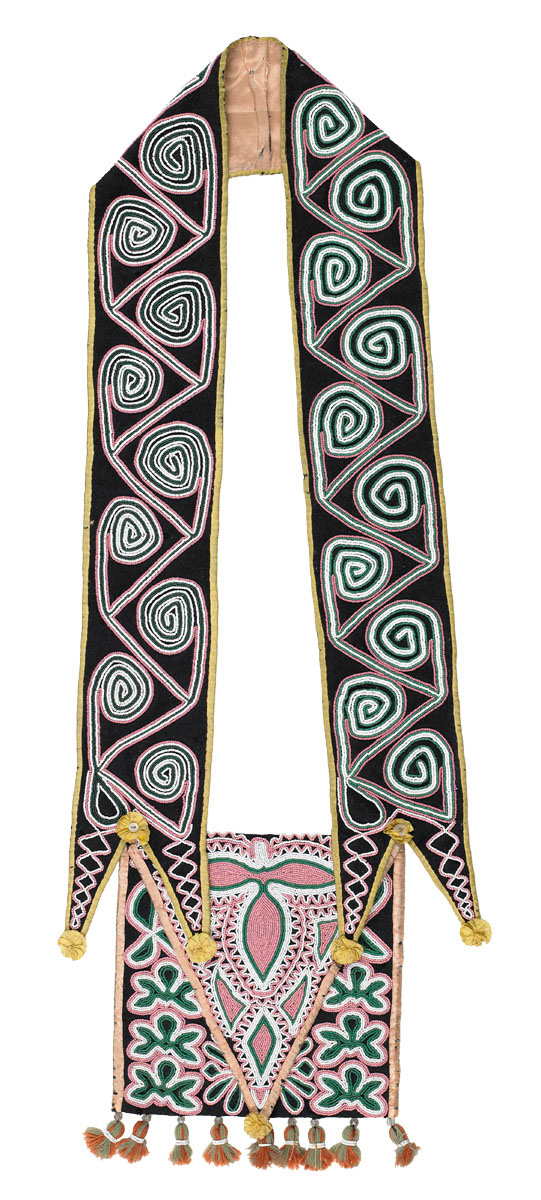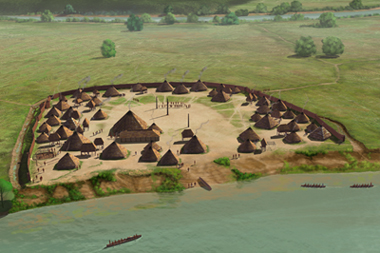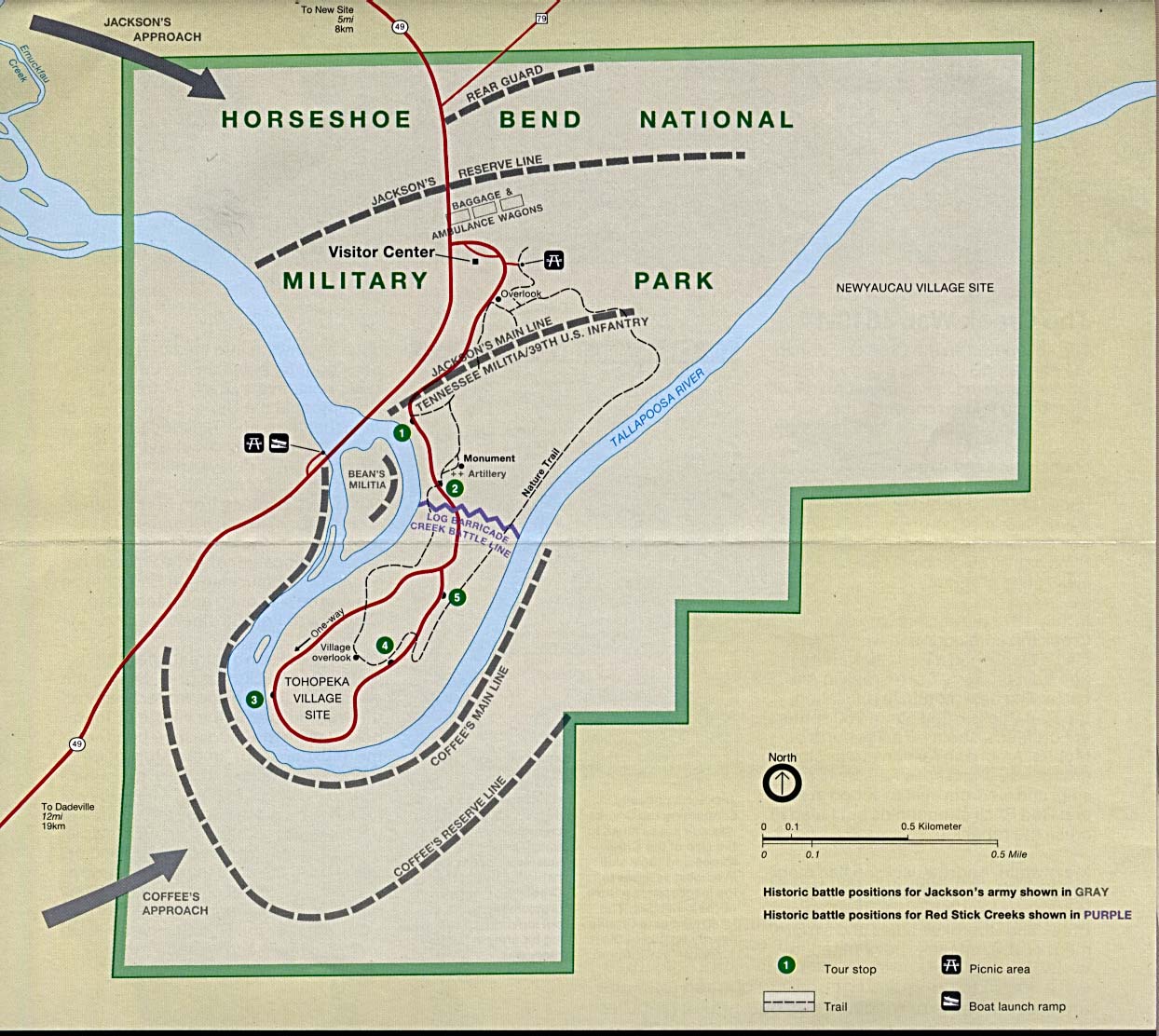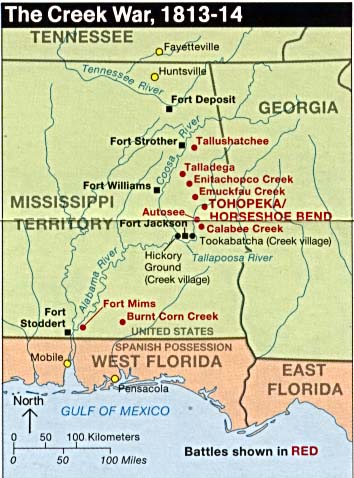|
Menawa
Menawa, first called ''Hothlepoya'' (c. 1765 – c. 1836-40), was a Muscogee (Creek) chief and military leader. He was of mixed race, with a Creek mother and a fur trader father of mostly Scots ancestry. As the Creek had a matrilineal system of descent and leadership, his status came from his mother's clan. He grew up among the Upper Creek in present-day Alabama and, as an adult, became part of the "Red Sticks", a group that opposed assimilation and worked to revive traditional practices. During the Creek War (1813–1814), he led Red Sticks warriors and survived the Battle of Horseshoe Bend. To carry out punishment for the crime of an unauthorized land cession, in 1825 Menawa led about 150 lawmenders in an attack on chief William McIntosh, who had signed the Treaty of Indian Springs that year without the consent of the Creek National Council. They killed him, burned his mansion, and confiscated his property, including livestock and 100 slaves. Early life and education ... [...More Info...] [...Related Items...] OR: [Wikipedia] [Google] [Baidu] |
William McIntosh
William McIntosh (1775 – April 30, 1825),Hoxie, Frederick (1996)pp. 367-369/ref> was also commonly known as ''Tustunnuggee Hutke'' (White Warrior), was one of the most prominent chiefs of the Creek Nation between the turn of the nineteenth century and his execution in 1825. He was a chief of Coweta town and commander of a mounted police force. He became a large-scale planter, built and managed a successful inn, and operated a commercial ferry business. Early American historians attributed McIntosh's achievements and influence to his mixed race Scots/European ancestry. Since the late 20th century, historians have argued much of McIntosh's political influence stemmed more from his Creek upbringing and cultural standing, particularly his mother's prominent Wind Clan in the Creek matrilineal system, and to other aspects of Creek culture. Because McIntosh led a group that negotiated and signed the Treaty of Indian Springs in February 1825, which ceded much of remaining Creek lands t ... [...More Info...] [...Related Items...] OR: [Wikipedia] [Google] [Baidu] |
Creek (people)
The Muscogee, also known as the Mvskoke, Muscogee Creek, and the Muscogee Creek Confederacy ( in the Muscogee language), are a group of related indigenous (Native American) peoples of the Southeastern WoodlandsTranscribed documents Sequoyah Research Center and the American Native Press Archives in the . Their original homelands are in what now comprises southern , much of , western |
Muscogee (Creek)
The Muscogee, also known as the Mvskoke, Muscogee Creek, and the Muscogee Creek Confederacy ( in the Muscogee language), are a group of related indigenous (Native American) peoples of the Southeastern WoodlandsTranscribed documents Sequoyah Research Center and the American Native Press Archives in the . Their original homelands are in what now comprises southern , much of , western |
Muscogee People
The Muscogee, also known as the Mvskoke, Muscogee Creek, and the Muscogee Creek Confederacy ( in the Muscogee language), are a group of related indigenous (Native American) peoples of the Southeastern WoodlandsTranscribed documents Sequoyah Research Center and the American Native Press Archives in the . Their original homelands are in what now comprises southern , much of , western |
Battle Of Horseshoe Bend (1814)
The Battle of Horseshoe Bend (also known as ''Tohopeka'', ''Cholocco Litabixbee'', or ''The Horseshoe''), was fought during the War of 1812 in the Mississippi Territory, now central Alabama. On March 27, 1814, United States forces and Indian allies under Major General Andrew Jackson defeated the Red Sticks, a part of the Creek Indian tribe who opposed American expansion, effectively ending the Creek War. Background The Creek Indians of Georgia and the eastern part of the Mississippi Territory had become divided into two factions: the Upper Creek (or Red Sticks), a majority who opposed American expansion and sided with the British and the colonial authorities of Spanish Florida during the War of 1812; and the Lower Creek, who were more assimilated into the Anglo culture, had a stronger relationship with the U.S. Indian Agent Benjamin Hawkins, and sought to remain on good terms with the Americans. The Shawnee war leader Tecumseh visited Creek and other Southeast Indian ... [...More Info...] [...Related Items...] OR: [Wikipedia] [Google] [Baidu] |
Red Sticks
Red Sticks (also Redsticks, Batons Rouges, or Red Clubs), the name deriving from the red-painted war clubs of some Native American Creeks—refers to an early 19th-century traditionalist faction of these people in the American Southeast. Made up mostly of Creek of the Upper Towns that supported traditional leadership and culture, as well as the preservation of communal land for cultivation and hunting, the Red Sticks arose at a time of increasing pressure on Creek territory by European-American settlers. Creek of the Lower Towns were closer to the settlers, had more mixed-race families, and had already been forced to make land cessions to the Americans. In this context, the Red Sticks led a resistance movement against European-American encroachment and assimilation, tensions that culminated in the outbreak of the Creek War in 1813. Initially a civil war among the Creek, the conflict drew in United States state forces while the nation was already engaged in the War of 1812 agains ... [...More Info...] [...Related Items...] OR: [Wikipedia] [Google] [Baidu] |
Treaty Of Indian Springs (1825)
The Treaty of Indian Springs, also known as the Second Treaty of Indian Springs and the Treaty with the Creeks, is a treaty concluded between the Muscogee and the United States on February 12, 1825 at what is now the Indian Springs Hotel Museum. Background The Muscogee and the United States had signed the First Treaty of Indian Springs in 1821, under which the former ceded their territory east of the Flint River to Georgia. In exchange, the federal government of the United States paid them $200,000 in installments and assumed their debts to the Georgian people. In December 1824, the American envoys Duncan Campbell and James Meriwether tried and failed to secure a treaty that would see the Muscogee cede their territory east of the Mississippi River to the United States. The treaty The treaty that was agreed was negotiated with six chiefs of the Lower Creek, led by William McIntosh. McIntosh agreed to cede all Muscogee lands east of the Chattahoochee River, including ... [...More Info...] [...Related Items...] OR: [Wikipedia] [Google] [Baidu] |
Opothleyahola
Opothleyahola, also spelled Opothle Yohola, Opothleyoholo, Hu-pui-hilth Yahola, Hopoeitheyohola, and Hopere Yahvlv (c. 1778 – March 22, 1863) was a Muscogee Creek Indian chief, noted as a brilliant orator. He was a Speaker of the Upper Creek Council and supported traditional culture. Although known as a diplomatic chief, as a Red Stick traditionalist he led Creek forces against the United States government during the Creek Wars. Later he tried to overturn the Treaty of Indian Springs, but was forced to make a new treaty with the federal government in 1832. He was commissioned as a colonel and led forces against remaining Lower Creek and the Seminole in Florida in the first two wars of the US against them. Despite his efforts, he and his people were among the Seminole and others forced to remove to Indian Territory in 1836, where they settled in the Unassigned Lands. During the American Civil War, Opothleyahola was among the minority of Creek in Indian Territory who supp ... [...More Info...] [...Related Items...] OR: [Wikipedia] [Google] [Baidu] |
Creek War
The Creek War (1813–1814), also known as the Red Stick War and the Creek Civil War, was a regional war between opposing Indigenous American Creek factions, European empires and the United States, taking place largely in modern-day Alabama and along the Gulf Coast. The major conflicts of the war took place between state militia units and the " Red Stick" Creeks. The United States government formed an alliance with the Choctaw Nation and Cherokee Nation (the traditional enemies of the Creeks), along with the remaining Creeks to put the rebellion down. According to historian John K. Mahon, the Creek War "was as much a civil war among Creeks as between red and white, and it pointed up the separation of Creeks and Seminoles". The war was also part of the centuries-long American Indian Wars. It is usually considered part of the War of 1812 because it was influenced by Tecumseh's War in the Old Northwest, was concurrent with the American-British portion of the war and involv ... [...More Info...] [...Related Items...] OR: [Wikipedia] [Google] [Baidu] |
People Of The Creek War
A person ( : people) is a being that has certain capacities or attributes such as reason, morality, consciousness or self-consciousness, and being a part of a culturally established form of social relations such as kinship, ownership of property, or legal responsibility. The defining features of personhood and, consequently, what makes a person count as a person, differ widely among cultures and contexts. In addition to the question of personhood, of what makes a being count as a person to begin with, there are further questions about personal identity and self: both about what makes any particular person that particular person instead of another, and about what makes a person at one time the same person as they were or will be at another time despite any intervening changes. The plural form "people" is often used to refer to an entire nation or ethnic group (as in "a people"), and this was the original meaning of the word; it subsequently acquired its use as a plural form of ... [...More Info...] [...Related Items...] OR: [Wikipedia] [Google] [Baidu] |
American People Of Scottish Descent
American(s) may refer to: * American, something of, from, or related to the United States of America, commonly known as the "United States" or "America" ** Americans, citizens and nationals of the United States of America ** American ancestry, people who self-identify their ancestry as "American" ** American English, the set of varieties of the English language native to the United States ** Native Americans in the United States, indigenous peoples of the United States * American, something of, from, or related to the Americas, also known as "America" ** Indigenous peoples of the Americas * American (word), for analysis and history of the meanings in various contexts Organizations * American Airlines, U.S.-based airline headquartered in Fort Worth, Texas * American Athletic Conference, an American college athletic conference * American Recordings (record label), a record label previously known as Def American * American University, in Washington, D.C. Sports teams Soccer ... [...More Info...] [...Related Items...] OR: [Wikipedia] [Google] [Baidu] |
Year Of Birth Uncertain
A year or annus is the orbital period of a planetary body, for example, the Earth, moving in its orbit around the Sun. Due to the Earth's axial tilt, the course of a year sees the passing of the seasons, marked by change in weather, the hours of daylight, and, consequently, vegetation and soil fertility. In temperate and subpolar regions around the planet, four seasons are generally recognized: spring, summer, autumn and winter. In tropical and subtropical regions, several geographical sectors do not present defined seasons; but in the seasonal tropics, the annual wet and dry seasons are recognized and tracked. A calendar year is an approximation of the number of days of the Earth's orbital period, as counted in a given calendar. The Gregorian calendar, or modern calendar, presents its calendar year to be either a common year of 365 days or a leap year of 366 days, as do the Julian calendars. For the Gregorian calendar, the average length of the calendar y ... [...More Info...] [...Related Items...] OR: [Wikipedia] [Google] [Baidu] |





.jpg)

_1938.jpg)
